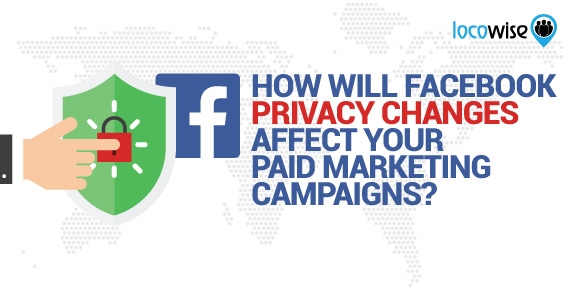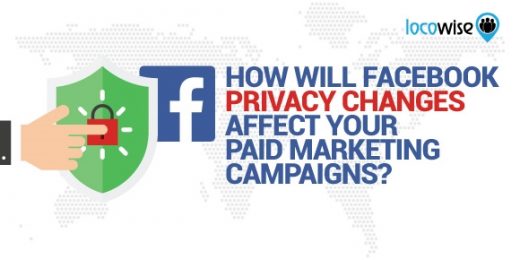How Will Facebook Privacy Changes Affect Your Paid Campaigns?
— July 16, 2018
Facebook has recently been involved in something very worrying. When Cambridge Analytica blew up, the social media giant suddenly looked like it had zero integrity. It has integrity, of course, but its reputation was damaged.
Mark Zuckerberg had to do something about this. In addition to taking some tough questions at a recent congressional hearing, the company decided that it would alter it’s approach to user privacy. While the fallout from that big change is not groundbreaking, it will have some impact on brands. Facebook has changed, and in the end, there’s definitely something for brands to think about moving forward.
In a way, complaints about privacy are nothing new for Facebook or social media in general.

However, the changes do show that the company is thinking seriously about bringing in the one thing that has been lacking. The main problem with Facebook, fundamentally, has been a lack of clarity about privacy. Users didn’t know enough about privacy settings, and whether or not this was a big part of the Cambridge Analytica problem or not, Facebook has moved quickly to make it a big part of the plans.
The announcement from the Vice President of Facebook as the changes were made it clear that the company was taking user privacy seriously:
Last week showed how much more work we need to do to enforce our policies and help people understand how Facebook works and the choices they have over their data. We’ve heard loud and clear that privacy settings and other important tools are too hard to find…
Erin Egan, FB Vice President.
So what’s changed?
Settings
The Settings menu prior to the changes was, at best, awkward. And this was not good. It made the Cambridge Analytica thing even more embarrassing, as users realised that they could not access all the privacy settings in one place. Facebook has changed this, and has redesigned Settings, so that privacy can be accessed and changed in one place.
This is a welcome change. Privacy matters, and having it easily accessible is a gesture from Facebook that will be welcomed. And users should now feel that some of that integrity is still there. Besides, prior to this change, Settings was essentially spread out over around 20 different screens.
A new menu
There’s also a brand new privacy shortcuts menu. Facebook says it’s important that Privacy should not only be clear but also easier to find. It’s made the new Privacy shortcuts clearer too, with the outcome being a simple interface that allows users to manage their settings easily.
There’s two-factor authentication involved, so if an outside party wants to access a user’s account, Facebook will know about it and ask the user if that person is them. This is clearly a strong attempt by Facebook to show how robust the new settings are.
Full control of information
The next big change is the ability to review what you shared or updated, and to remove anything you’re not happy with. This is actually quite innovative for Facebook. It hasn’t really paid this much attention (and that’s a phrase we think is appropriate for the company) to the protection and privacy of the content that users produce.
It simply means that users now have full control over what they create, and then delete. It’s a welcome and useful change, and should placate users and critics who think Facebook is shadowy and open to sharing user details with other agencies.
How far does this stretch? Well, the new rules allow you to download your data. This is something that screams ‘trust’ and is evidence of Facebook basically saying that it wants to be completely transparent. By being in complete control of whatever you upload, you’re going straight back to how social media should be.
However, we think there is even more to it than that. Facebook was started in a college dorm by a visionary, not a businessman. That visionary made sure that he pulled together a project that would bring some benefit to people.
What’s interesting is that original concept. The Big Idea that Zuckerberg had all the way back then. He simply wanted to make it easier for people to connect with others online. Email was around, so he had to disrupt the idea of emails and bring in the concept of community. In a way, we think that the new privacy controls are doing what some people thought was impossible. We think the controls are bringing Facebook back to its roots.
What this means for paid marketing
If you’re running a paid marketing campaign for a client, the one thing you should now be 100% focused on is authenticity. With audiences now even more wary than they were before about privacy and data, it’s your job to maintain that trust.
However, recent reports have suggested that Facebook is going to make it even easier to feel comfortable online. It is considering offering a subscription option, which will allow you to have an ad-free experience. It’s thinking of doing this because it wants to show that it can take away some of the audience pain, and it wants to reassure people that ads will no longer harvest data, and that Facebook is not selling that data to advertisers.
So, if anything, we recommend that brands take a good long look at their facebook presence, and the content they have. Can brands afford to lose ads and the impact they had on sales?
Digital & Social Articles on Business 2 Community
(8)


